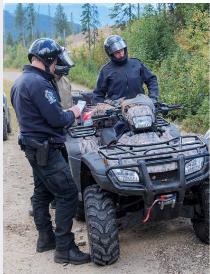Improved road access for ORVs
On this page
Safe and more convenient incidental access to public roads and highways is key to the Off-Road Vehicle (ORV) Management Framework.
Highways (public roads)
Amendments to the Motor Vehicle Act Regulations, Division 24 allow off-road vehicle operators greater access to highways, including the ability to:
- Cross a highway without having to obtain an operation permit if the crossing is controlled by a stop sign or traffic light
- Travel on any highway anywhere local police authorize, within the limits set out in an operation permit
- Load or unload in a parking lot without an operation permit
- Obtain an operation permit with an extended term of up to two years
All other Motor Vehicle Act requirements on highways have not changed (e.g., the requirement for ICBC's basic insurance and a valid driver's licence). When in doubt, ORV operators should contact local law enforcement to inquire whether an operation permit is required. Police-issued operation permits continue to be free.
- Find out about vehicles restricted to incidental access (PDF, 196KB)
- Insurance Corporation of B.C. toll-free: 1-800-663-3051
- Transporting ORVs on Highways
The B.C. government continues to implement improved road and highway crossings, in stages, under the Motor Vehicle Act. Improved incidental access will better connect B.C.'s rural communities and support a first-rate ORV trail network.
On public roads and highways, the Insurance Corporation of B.C.'s basic insurance continues to be a requirement for all motorists, including ORV owners. ORV riders who opt for incidental access to highways will also require ICBC’s basic insurance.
Resource Roads (Forest Service Roads)
Be safe when sharing a resource road with industrial vehicles – check out this brochure about off-road vehicles using resource roads:
The basic requirements on a Forest Service Road continue to apply, such as a valid driver’s licence and having a minimum of $200,000 in third-party liability insurance. On all other Crown land, third-party liability insurance is voluntary but recommended.
The Forest Service Road Use Regulation has been amended as follows:
- A snowmobile operator may cross a ploughed Forest Service Road if the operator has a valid driver’s licence, $200,000 third-party liability insurance, and both the driver and passenger are wearing a helmet
- In addition, the snowmobile operator must yield the right-of-way to other traffic, exercise due care and attention and take reasonable precautions for the safety of other persons using the Forest Service Road.

Anyone who witnesses a contravention is encouraged to call the Conservation Officer Service and Natural Resource Violations hotline at 1-877-952-7277 (or #7277 on the TELUS Mobility Network).
Contact information
If you have questions about the ORV Management Framework, please contact Vera Vukelich, Manager responsible for ORVs.
